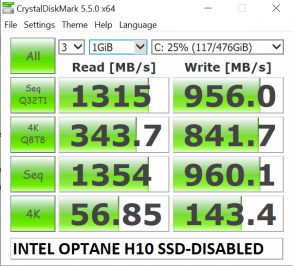TESTING THE OPTANE H10 WITH SYNTHETIC BENCHMARKS
We wanted to include just a bit of synthetic benchmarking to establish the starting point for the QLC SSD (Intel 660P twin) without Optane enabled, with Optane enabled, and then compared to the Intel 760p NVMe SSD. Just as a bit of a background, the Intel 660p QLC SSD has listed specs of 1.5GB/s read and 1GB/s write throughput. as published in our published report here. The fact that specifications of the Optane H10 are 2.3GB/s read and 1.3GB/s write for the 512GB capacity already speaks to the ability of Optane. As well, we will see that the Intel 760p is a monster compared to the H10…at least in synthetic testing.
CRYSTAL DISK BENCHMARK VER. 6.0.0 X64
Crystal Disk Benchmark is used to measure read and write performance through a sampling of random data which is, for the most part, incompressible. Performance is virtually identical, regardless of data sample so we have included only that using random data samples.
We can see a significant performance increase in the Optane H10 when Optane has been enabled within the IRST Panel. Although it was great to also meet listed specs for the H10, it is very interesting to recognize the vast performance difference between the Optane H10 and the 760p. In our original usage scenario testing, the Optane H10 seemed to be the victor ,whereas, the 760p is definitely in charge here.
The SSD Review uses PCMark 8’s Storage test suite to create testing scenarios that might be used in the typical user experience. With 10 traces recorded from Adobe Creative Suite, Microsoft Office and a selection of popular games, it covers some of the most popular light to heavy workloads. Unlike synthetic storage tests, the PCMark 8 Storage benchmark highlights real-world performance differences between storage devices. After an initial break-in cycle and three rounds of the testing, we are given a file score and bandwidth amount. The higher the score/bandwidth, the better the drive performs.
PCMARK 8 STORAGE RESULTS
Considering this was once again a straight test, we were very impressed as the Optane H10 seemed to hold its own against some of the best in the business. A bit odd perhaps but we highlighted how it had a better average transfer speed than the 760p yet lower than the 660P.
TxBench is one of our newly discovered benchmarks that we works much the same as Crystal Diskmark, but with several other features. Advanced load benchmarking can be configured, as well as full drive information and data erasing via secure erase, enhanced secure erase, TRIM and overwriting. Simply click on the title for a free copy.
We wanted to use these TxBench results to demonstrate something that was common in most of our synthetic benchmarks, the results appeared skewed in some manner. We can see here that the performance is far better with Intel Optane activated, however, those high sequentials are just a bit off. We actually had a rather extensive back and forth with Intel and were told that the Intel Optane H10 has not been adapted for synthetic testing, but rather the disk cache testing which is the premise that this SSD is, in fact, marketed.
 The SSD Review The Worlds Dedicated SSD Education and Review Resource |
The SSD Review The Worlds Dedicated SSD Education and Review Resource | 


“In this test [PCMARK], there were no repeated runs to establish a disk cache. It was a single run where the H10 Optane bettered the Intel 760P NVMe SSD in three of four tests, although all were very close.”
The numbers pictured say that the 760p is better in 3 of the 4 tests, not the other way around, did you input things backwards?
Odd and I removed that statement. Thank you. When time permits, we will be rerunning this test.
Optane only works with Intel compatible motherboards etc.
That sucks big time. Very limited in what hardware it will work with.
Exactly like Apple. I’m waiting for Samsung and others to catch up.
Optane like many Intel products are over hyped and over priced just like nvidia.
Valid points. Thank you.
How did it affect system bootup times?
System boot times were faster, keeping in mind that they are already fast for an SSD. Boot time is one of the areas that increase as hot data is saved.